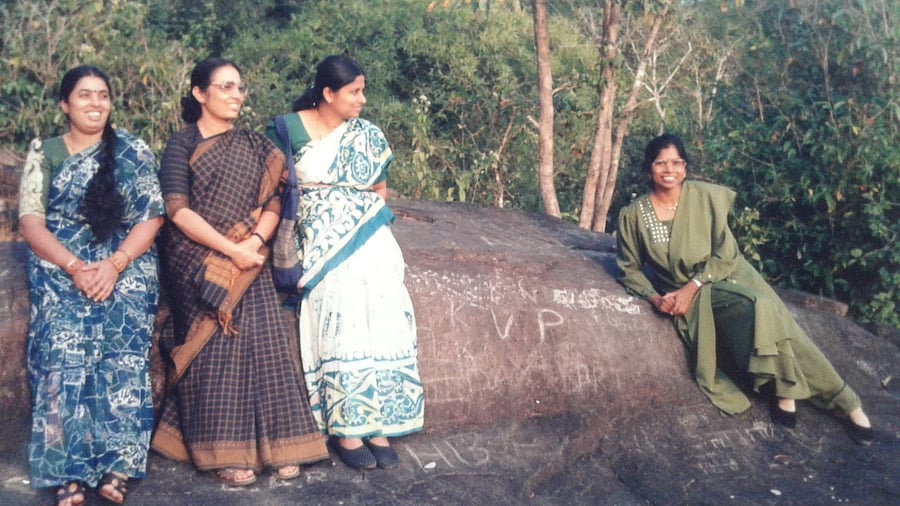
Vijaya Dabbe (far left) with her sister Vimala and writers L G Sumitra and Nemichandra (far right) at Kavishaila in Kuppalli in 1998.
Photo courtesy: Author
The year was 1980. I had just returned to Mysore from an all-India tour, which was part of my curriculum as an engineering student. Soon, I was at Vijaya Dabbe’s house, she lived on the same street. I went and poured my heart out to her in anger. There were four of us girls on this tour, amongst a big batch of boys. We were refused entry at two factories, with the most chauvinistic explanations.
As I fumed, Vijaya calmly explained that the women’s movement was fighting against exactly such discrimination. She asked me to write about my experience. This was published in the December 1980 issue of Samatha, a feminist magazine published by Samatha Vedike. Vijaya Dabbe was one of the founder members of the group.
Samatha Vedike, established in 1978, left an indelible mark on Karnataka’s women’s movement through its collective struggle for women’s rights and activism, to address atrocities against women.
Vijaya Dabbe, the eldest of eight children, had rented a house in Mysore where she lived with her younger siblings, to see through their education and get them settled.
I was one of the innumerable young women and men who were introduced to feminism and the aspiration for an equal world by Vijaya.
Vijaya was an eminent writer, poet, critic, researcher and a professor, best known as one of the earliest Kannada feminist writers of the previous century. She was a vocal critic of patriarchy, but was never scathing. She would patiently speak to men who felt insecure that in an ‘equal world’, they would lose their privileges.
She said, “Feminism is born out of the anguish and pain of exploitation, a deep empathetic understanding of the same is required to mitigate it.” Her feminist ideas are comprehensively narrated in her two books, Mahile Sahitya Samaja, and Nari Dari Diganta.
Vijaya Dabbe was born in a small village, ‘Dabbe’, in Hassan district in 1952. She had started writing poems at school, and this skill evolved and matured in her college days. After obtaining a BA degree in Hassan, she moved to Manasa Gangothri for her Master’s degree in Kannada and later, her PhD. Her doctoral thesis was a study of the 12th-century poet Nagachandra.
Her writing
Vijaya entered the literary field with her first poetry collection in 1975, titled Iruttave. Her second poetry collection was Neeru Lohada Chinthe, the third one was Thirugi Nintha Prashne — the three were combined together in the collection titled Ithi Geethike.
Her poetry reflected her thoughts, feelings and the lived experiences of women in a patriarchal society. ‘A lap full of cinders, I know, I know mother, I should never breathe out. Even if I am burnt inside, my whimpers should never be heard...’ — so goes an excerpt on the lesson learnt from Amma, in the poem Maretilla (I have not forgotten).
In 1998, she edited the first volume of Lekha-Loka — an anthology of autobiographical narrations by women writers, with an insightful introduction. In an effort to rediscover the rich history and heritage of Kannada women writers, she wrote well-researched books on early writers like Nanjangud Tirumalamba and Shyamala Devi Belgavkar.
She married Robert Zydenbos, who was from the Netherlands. His doctoral thesis was on the cultural aspects of post-independence Kannada katha sahitya. Their little daughter, Charumathi Sophia, was fluent in both Kannada and Dutch back then.
In 1998, I did a formal interview with Vijaya for an article in Prajavani on the occasion of her receiving the prestigious Anupama award. She was a reader at the Kannada Adhyayana Samsthe and was a guest faculty at the Mahila Adhyayana Samsthe at Mysore University.
Despite her remarkable life and work, she had said, “My efforts are like droplets in an ocean.”
Vijaya was virtually bustling with ideas to improve the condition of women in our society and was closely involved in the development of a women’s rehabilitation centre.
Sadly, all that came to an abrupt halt on January 6, 1999, when she met with an accident, resulting in memory loss. With grit and tenacity, she did regain some of her memory. However, the brilliant writer and speaker Vijaya Dabbe was dearly missed by the literary world. She passed away in 2018. The fire of feminism she lit continues to burn brightly in an effort to dispel the darkness of toxic masculinity and chauvinism.